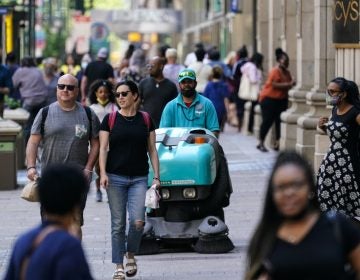Enlisting parents in the quest for better Philadelphia schools
Philadelphia School District officials say parental involvement is the key to improving struggling neighborhood schools. But keeping parents engaged isn’t easy.
On a cold Saturday morning when most people would rather be home in bed, more than 150 parents of kids in public school gathered at Ben Franklin High for a summit of the district’s school advisory councils or SACs.
Karen Dunklee made sure to thank the stalwart group.
“These are the folks who are on the ground, in the trenches, corralling this effort,” said Dunklee, head of the district’s office of parent and community engagement. “If I had a million dollars, I would give it to each of you.”
Dunklee’s job is to expand and improve the SACs. At the recent Saturday meeting, SAC members from across Philadelphia assembled to learn more about how to improve their schools.
A matter of social justice
Rochelle Nichols Simon, a district adviser, put their work in context.
“We call this education, but it’s really social justice,” said Nichols Simon. “This is really a social justice issue.”
Nichols Simon shared the story of a struggling student named Russell. His school was ready to let him slide, but Russell’s mother pushed relentlessly to get him help.
Today, he’s a successful dentist, she said–as well as her brother. She said the councils can help the Russells in every school.
“You’re in a structure where you are there, not just to serve your student, even though that’s probably what drives you and brought you to the table,” she said. “But you’re there to serve all students–making really hard decisions, really understanding what needs to be in place so that, in fact, all students are served well.”
School advisory councils were the brainchild of former district superintendent Arlene Ackerman. Including community members as well as parents, they are asked to work closely with principals to make day-to-day improvements.
Taking a musical tack
Dorian Harris, who chairs the SAC at the Pastorius School in Germantown, said his group began making a difference right away.
“I’m new to that area, and I noticed they didn’t have music. And you know, music is inspirational to every kid,” Harris said. “So we noticed that some of the kids that we knew were having problems. And once we got them into music class, they let their anger out on the drums, or blowing the horn. So we see the difference in the kids.”
Harris’ council helps interview new teachers, and advises the principal about discipline and curriculum.
Acting Superintendent Leroy Nunery says that’s just the start of what a good SAC can do.
“Review the budget. Have a firm understanding of the curriculum. Look at school safety, and school supports, and make sure we understand which kids are getting which services, and what the gap is between what they need and where they are,” Nunery said.
When it comes to parental engagement, however, officials and parents agree that the district has a long way to go.
“It’s very hard because, especially at the high school level, you gotta remember, parents check out,” said Yvette Mitchell, who chairs the advisory council at University City High School.
She said she’s learned who to call about an ice-covered school yard. She’s helped bring in more AP classes. And she’s learned to spot what she calls the school’s obvious disconnects.
Bridging a disconnect
When her son was a junior, she said she heard plenty about state-mandated PSSA tests. Now that he’s a senior, she hardly hears anything about college entrance exams.
“You call me, you remind me about the PSSAs, but what about 11th grade, 12th grade, the ACTs, the SATS? I don’t see a huge push for that. If you’re not in it and you don’t know, how many parents know the college fair’s coming up next week?” said Mitchell. “So I think there’s a disconnect between what’s important to the school district and what should be important to the children.”
Mitchell wants her SAC to push the school to do more for juniors and seniors. And district officials say they welcome that kind of input. But, given the district’s budget troubles, they say there’s only so much support they can provide the councils.
SACs have to recruit their own members and schedule their own meetings. The district can’t even give them money for snacks.
Julia Manakeena of the district’s parent engagement office says the councils have to get creative.
Key, she said, are “donations. Donations and looking for resources. We have grocery stores, we have community stores, some people bake a pie and bring it.”
The SAC experiment is still in its infancy. Out of 249 schools, only about 30 have active councils–and their effectiveness varies widely. But when they work, said Mitchell, the councils can help hold a district school to a parent’s standard.
“And again, it’s not just about the classroom. It’s what does the school climate look like? Is it clean? Is there toilet paper in the bathrooms?” said Mitchell. “It’s not just about academics. It’s about, what kind of environment is your child coming into–because that will affect your child.”
WHYY is your source for fact-based, in-depth journalism and information. As a nonprofit organization, we rely on financial support from readers like you. Please give today.




